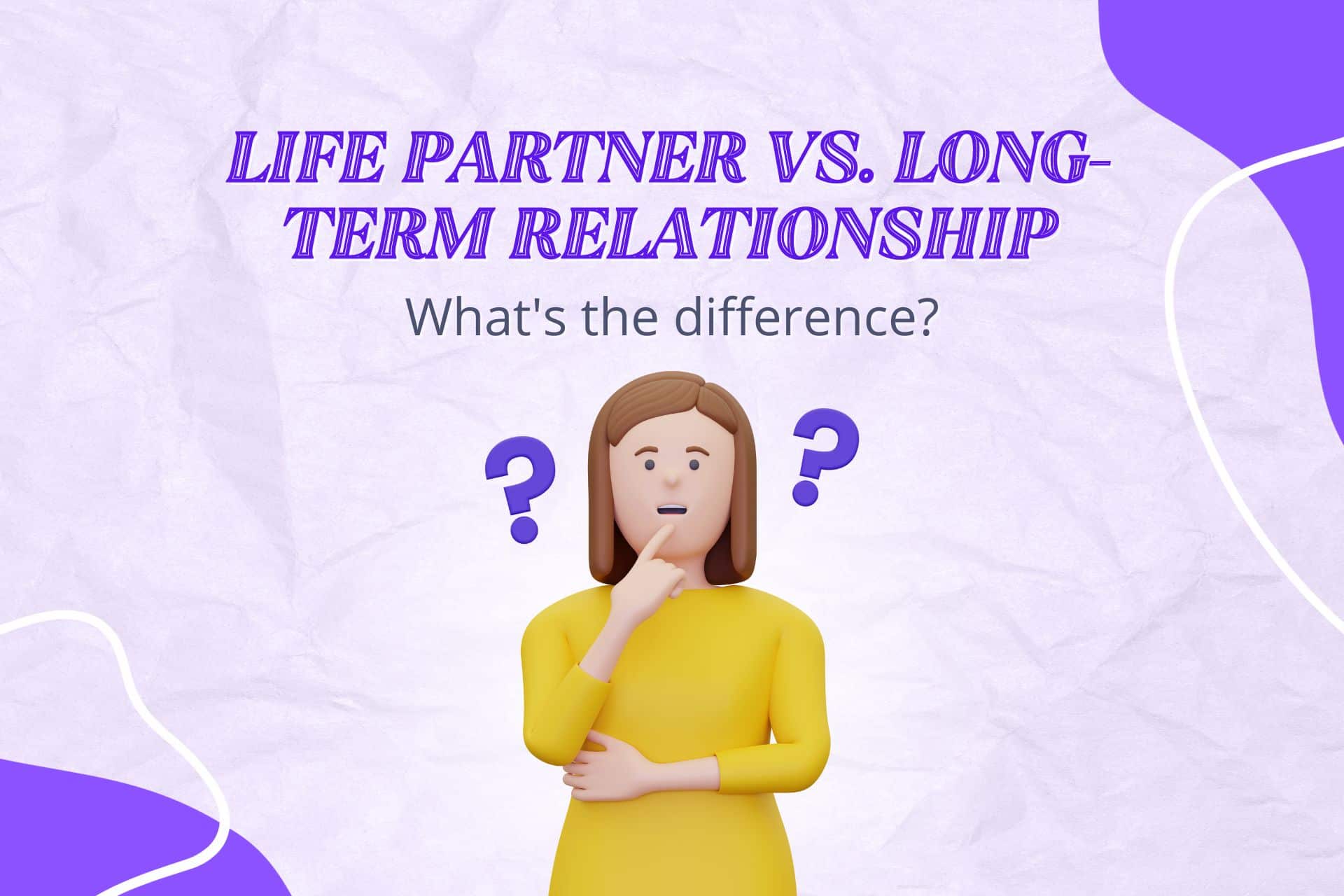The Ultimate Guide to Choosing Your Forever Love
Finding the balance between work, self-care, and love life is like walking a tightrope—exciting but often wobbly. Are you torn between warm, cozy Netflix evenings with your significant other and climbing the career ladder?
We get it! You’re not alone in wondering where your relationship is heading. Is it a long-term thing, or are they your life partner?
Trust us, this isn’t our first rodeo on matters of the heart and the hustle. We’ve got the low-down on everything you need to know about life partner vs. long-term relationship.
So stick around because, by the end of this post, you’ll have a much clearer picture to pick your life partner, your happily-ever-after—or at least, your happy-for-now. Shall we?
Let’s get started!
Here's What You Will Find

Key Takeaways
Life Partner vs. Long-Term Relationship
Know Your Needs: Understanding the differences between a Life Partner and a Long-Term Relationship can empower you to make more fulfilling choices in love, setting the stage for a happier, more aligned future. Whether you’re seeking a life partner or a long-term relationship, it starts with self-reflection. Know what you want to make better choices in love.
Communication is Key: No relationship thrives without open dialogue. Make it a habit to talk about your needs, fears, and dreams with your partner.
Balance is Achievable: Juggling work and love may feel like a circus act, but it’s entirely possible. Setting priorities and boundaries can help you keep both balls in the air.
Invest Wisely: Whether it’s a long-term relationship or a life partnership, know that different types of relationships require different levels of emotional, time, and resource investment. Ensure you’re putting your all into something that aligns with your long-term goals.
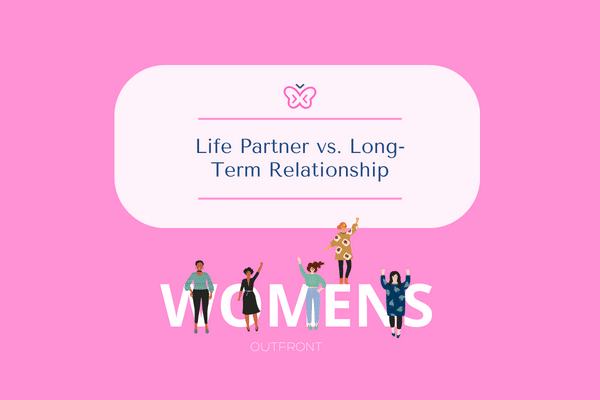
Navigating the labyrinth of love while balancing career goals and personal well-being is no small feat—especially for women who often juggle more than their fair share of responsibilities. Whether you’re climbing the corporate ladder, shattering glass ceilings, or building a home, your love life is inevitably part of the equation.
The distinction between having a Life Partner and being in a Long-Term Relationship can impact not only your emotional landscape but also how you approach your daily grind.
This is more than just semantics; it’s about aligning your relationship choices with your life goals. So, if you’ve ever caught yourself pondering the life partner vs. long-term relationship conundrum, read on. This is your roadmap to understanding what each can bring to your table—or take off it.
Why is This Topic Important for Women?
Let’s spill some truth tea, shall we? The state of your love life can be a game-changer in managing your work-life equilibrium. Yeah, you heard it right! Whether it’s a long-term relationship or a life partner by your side, the dynamics you share with your significant other can have ripple effects that stretch far beyond your cozy date nights.
Mental Health Impacts
Have you ever had an argument before a big presentation or felt the emotional exhaustion of a relationship spat while you’re on deadline? It’s like trying to swim upstream—without a paddle. Relationships significantly affect our mental health, for better or worse. A supportive partner can be a confidence-boosting powerhouse that fuels your ambition.
On the flip side, a turbulent relationship can spiral into a vortex of stress and anxiety, impacting your focus and productivity. And let’s be real; it’s often women who are expected to be the emotional stabilizers in relationships, adding an extra layer of mental gymnastics to an already packed schedule.
The Work-Life Seesaw
If your work is a demanding toddler that needs constant attention, then consider your relationship the other child teetering on the opposite end of the seesaw. You lean too much into one, and the other may feel neglected.
Achieving a harmonious balance between work and love life can be especially challenging for women, who often shoulder the double burden of professional aspirations and domestic responsibilities. The clarity of knowing whether you’re in it for the long haul or forever with your partner can influence how you distribute your emotional labor and time investments.
Choices, Choices, Choices
You’re not just choosing a partner; you’re choosing a lifestyle, a co-pilot for your journey—whether that includes a white picket fence or glass ceilings, or both.
Deciphering the nature of your relationship—life partner vs. long-term relationship—can actually help you make more informed decisions. It can determine how you set boundaries, how you prioritize, and even how you navigate challenges both at work and at home.
Essentially, understanding the dynamic you share with your significant other is pivotal in laying the groundwork for a balanced life.
So yes, the topic is crucial—unless you plan on being an island, and even then, islands have ecosystems that need balance. Understanding whether you’re committed to a long-term relationship or have a life partner impacts not just your present but your future—the kind of future that’s made up of both dreams and deadlines.
What Defines a Long-Term Relationship?
Hold the phone; we’re not talking summer flings or casual date nights here. A long-term relationship is the real deal in many ways, but how do we put a pin on its defining characteristics?
Length of the Relationship
First off, let’s chat about duration. Long-term means, well, long-term—think years, not months. However, time itself isn’t the ultimate marker; it’s more like a litmus test that indicates the relationship has weathered some storms and basked in some sunny days.
How much time is considered a long-term relationship?
The length of time considered to constitute a “long-term relationship” can vary widely depending on individual perspectives, cultural norms, and even academic studies. There’s no universally accepted timeframe, but many people start considering a relationship long-term after about a year or two of being together. In some cases, the label might be applied even sooner, depending on the level of emotional investment, commitment, and future planning involved.
According to various psychological studies, it generally takes about two years of dating for most couples to enter the “committed” stage, where they’re likely planning a future together. But again, this varies.
If you’re in a relationship and wondering whether it’s “long-term,” consider not just the length of time you’ve been together but also the quality of that time, your emotional investment, and your plans for the future. All of these factors can provide a more nuanced answer than just a simple timeframe.
Emotional Investment
Now, let’s get to the mushy stuff: emotional investment. A long-term relationship requires the effort of keeping the spark alive but within a comfort zone. You care for each other deeply but might not jointly plan how your rocking chairs should look side by side in your twilight years.
It’s like having a favorite cozy sweater—warm, comforting, and reliably there—but not necessarily the one you’d frame as a keepsake.
Goals and Future Planning
While there may be discussions about plans, they often come with an asterisk or a “let’s see where life takes us” tagline. Whether it’s about relocating for jobs or thinking about family planning, the long-term relationship often has a touch of the tentative.
The roadmap is there, but it’s more like a rough sketch than a GPS-guided path.
Is “Long-Term” Enough?
You know that saying, “Don’t let perfect be the enemy of good”? It’s a two-sided coin, especially in relationships. The idea of “good enough” can either be a practical mindset or a potential pitfall.
Being in a long-term relationship might tick many boxes—emotional stability, companionship, and shared interests. But there’s a thin line between contentment and complacency. The “good enough” mentality can sometimes put you in cruise control, making you overlook what you might genuinely desire or need in a life partner.
And let’s face it, ladies, “settling” can turn into a prolonged episode of self-compromise, which isn’t a series any of us want to star in.
So, “long-term” could be enough, and that’s absolutely fine! But it’s essential to check in with yourself regularly. Are you staying because it’s genuinely fulfilling, or is it because you’ve grown accustomed to the landscape?
Remember, in pursuing a balanced life and love, the only person you should ever settle for is the one who helps you find that balance without losing yourself in the process.
What Makes Someone a Life Partner?
Alright, let’s get down to the nitty-gritty of what separates a life partner from a long-term relationship—because trust me, it’s not just about changing your Facebook status to “In a Serious Relationship.” It’s more like going from a pilot episode to signing on for an entire lifetime series.
Emotional and Intellectual Compatibility
Do you know that feeling when someone not only gets your jokes but also understands your silence? That’s emotional and intellectual compatibility in a nutshell. With a life partner, the emotional bandwidth is wide enough to include all your complexities.
Whether you’re discussing world politics, deciding on your next vacay spot, or debating over Netflix vs. Hulu, your wavelengths are in sync.
Shared Life Goals
It’s like you both have a mutual Pinterest board for your future, and you’re equally excited to pin on it. Be it career aspirations, whether or not to have kids, or where you’d like to grow old together—these aren’t just passing conversations; they are integral parts of your partnership planning process.
Commitment to Growth (Personal and Together)
You both view life as an endless loop of learning and growing, and you want to do it side-by-side. Personal growth? Check. Relationship growth? Double check. Even when the going gets tough, you’re committed to working things out—not just sweeping issues under the proverbial rug.
What is Considered a Life Partner?
A life partner is someone with whom you share a deep emotional and often legal connection, typically characterized by a long-term commitment, mutual respect, and a shared vision for the future. Unlike more casual or short-term relationships, a relationship with a life partner carries a sense of permanence and is rooted in mutual growth—both individually and as a couple.
Life partners often share similar values and life goals, making it easier to navigate major life decisions, from buying a house to starting a family or planning retirement. Emotional and intellectual compatibility is usually high, making for a relationship that is both fulfilling and supportive.
Commitment to personal growth and mutual growth is also a hallmark of life partners. They’re the person you turn to in a crisis, the one who supports your goals unconditionally and encourages you to be your best self. They’re not just there for the good times; they stand by you through challenges and hardships, too.
The term “life partner” can apply to married couples, but it’s not exclusive to them. People in committed, long-term relationships can also regard each other as life partners without a legal or religious ceremony. The essence of being life partners lies more in the commitment and intentionality of the relationship than in its legal status.
Are Life Partners Born or Made?
Ah, the age-old debate: Is it fate, or do you have to work at making your stars align? Spoiler alert: it’s a bit of both.
The Role of Effort and Intention in Sustaining a Relationship
Think of it this way: If a relationship is a garden, then a life partnership is where both of you are committed gardeners. Sure, some of the plants—love, initial chemistry, shared interests—were probably there to begin with. But you both consciously try to water the garden, remove the weeds, and celebrate each bloom.
You’re not just relying on Mother Nature; you’re both out there, gardening gloves on, making sure things continue to flourish.
So, are life partners born or made? They are born out of shared values and vision but made in the everyday choices you both make to nurture and sustain your relationship. It’s in the intentionality, the daily commitment, and the mutual efforts to make the garden of your relationship evergreen.
So, yeah, you could say it’s serious, but in the best, most nurturing way possible.
What are the Signs of a Good Life Partner?
Finding a good life partner is a bit like hitting the relational jackpot. While there’s no one-size-fits-all formula, there are several key signs that may indicate you’ve found someone who’s “for keeps.” Here’s what to look out for:
- Shared Values: You both have similar core values, whether it’s family, career aspirations, or ethical standards.
- Mutual Respect: There’s a strong sense of mutual respect for independence, choices, and individuality.
- Good Communication: You both can talk openly about your feelings, concerns, and plans, and you feel heard when you do so.
- Emotional Availability: Both of you are emotionally available and invested in each other’s well-being.
- Commitment to Growth: You’re both committed to growing—both as individuals and as a couple.
- Shared Vision of the Future: You have compatible goals and visions for your future together, and you’re both willing to work towards them.
- Kindness and Compassion: Simple acts of kindness are frequent and mutual; they’re the norm, not the exception.
- Trustworthiness: You can rely on each other for emotional support, and you have each other’s backs in times of crisis.
- Quality Time: You enjoy spending time with each other, and those moments only deepen your connection.
- Physical Compatibility: While perhaps not the most crucial factor, physical attraction and compatibility can strengthen a relationship.
- Conflict Resolution: Arguments happen, but they’re resolved through compromise and understanding rather than escalating into major disputes.
- Financial Compatibility: You have a similar outlook on financial goals and spending, even if you don’t have the same income.
Remember, no one is perfect, and it’s okay for a life partner not to tick every single box. The key is whether you’re both willing to work on building a meaningful, mutually fulfilling relationship.
10 Detailed Differences: Life Partner vs. Long-Term Relationship
So you’re still wondering, “Is my partner a forever mate or more like a long-haul companion?” No worries, we’ve all been there, sifting through the subtleties.
In the quest for love, it’s crucial to know whether you’re seeking a Life Partner or a Long-Term Relationship. While both offer meaningful connections, a Life Partner is someone you see as an integral part of your future, sharing deep emotional and intellectual bonds and growing together personally and as a couple. A Long-Term Relationship, on the other hand, may have a significant emotional investment but might not carry the same level of long-term commitment or intertwined life goals.
Knowing the difference can help you navigate your romantic journey with more clarity and purpose.
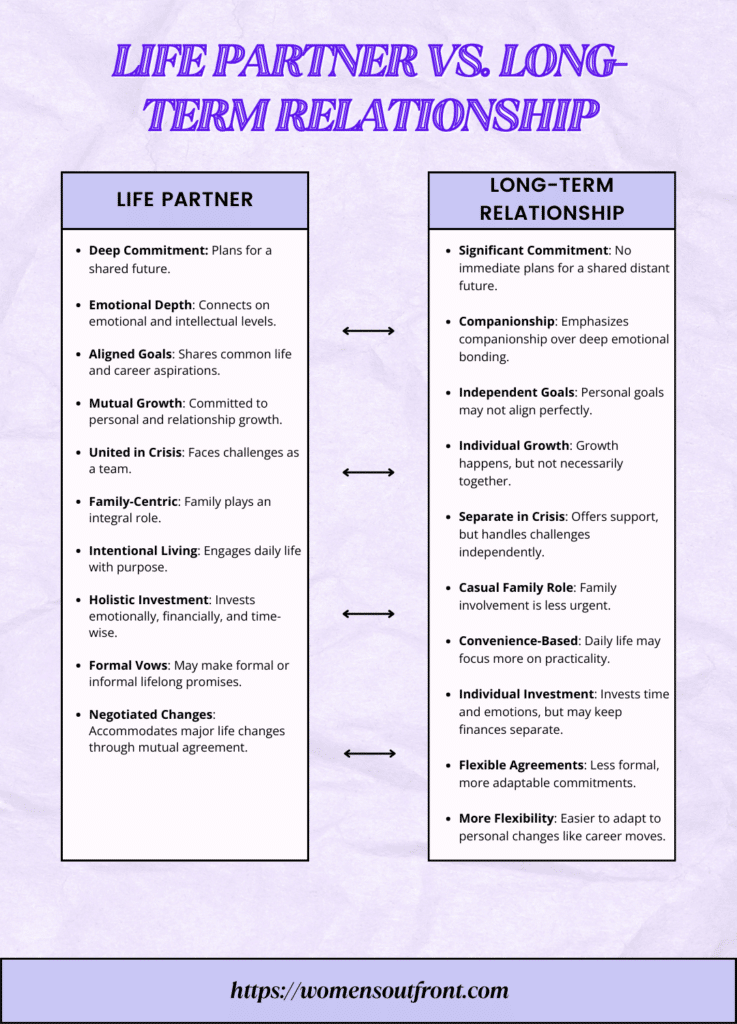
Here’s a concise list highlighting the differences between a Life Partner and a Long-Term Relationship:
1. Commitment Level
Life Partners often have a deeper level of commitment that involves planning a future together, whereas Long-Term Relationships might not necessarily include plans for permanence.
2. Emotional Depth
A Life Partner usually offers a deeper emotional and intellectual connection, while a Long-Term Relationship might focus more on companionship and less on deep emotional bonding.
3. Shared Goals
Life Partners often have aligned life goals and visions for the future, including family planning, career paths, and more. In Long-Term Relationships, these goals might not be as tightly aligned.
4. Personal Growth
With a Life Partner, there’s often a mutual commitment to personal and collective growth, while in a Long-Term Relationship, growth may happen, but it’s not necessarily a joint effort.
5. Crisis Management
Life Partners are more likely to face challenges and crises as a united front, whereas individuals in Long-Term Relationships might offer support but handle challenges more independently.
6. Family Involvement
Family tends to play a more integral role in the life of Life Partners. In Long-Term Relationships, family involvement might be more casual or less imperative.
7. Day-to-Day Dynamics
Life Partners often engage in their relationship with a sense of intentionality in daily activities, while Long-Term Relationships may focus more on convenience.
8. Investment Types
Life Partners invest time, emotions, and often finances into a shared future. In a Long-Term Relationship, these investments may be more individualistic.
9. Vows vs. Agreements
Life Partners may make formal or informal vows to each other about their commitment. In contrast, Long-Term Relationships often involve less formal agreements.
10. Flexibility
Long-term relationships may offer more flexibility and freedom in certain areas like career moves or individual pursuits. At the same time, Life Partners may need to negotiate these changes more carefully to accommodate both parties.
Understanding these differences can guide you in choosing the relationship that best suits your current needs and future aspirations.

Here’s a breakdown that might help you separate the wheat from the chaff:
The Commitment Factor
Vows vs. Agreements
In a long-term relationship, commitments often come as spoken or unspoken agreements. You’re together, yes, but the stakes might be lower. With a life partner, it’s like taking vows, even without a ceremony. The commitment transcends spoken words—it’s an unbreakable bond.
The Future Perspective
A Journey vs. A Chapter
When you’re in a long-term relationship, it’s like a chapter in the grand book of your life. It’s significant; it has its highs and lows, but it may not be the entire story. A life partner, on the other hand, is in for the whole journey, through every subsequent chapter, until the end of the book.
Emotional Depth
Surface-Level vs. Deep-Seated Connections
In a long-term relationship, you share a strong emotional bond, but it may not explore every nook and cranny of your inner world. With a life partner, the emotional connection digs deep—it’s like knowing the lyrics, the tune, and the backstory of each other’s life songs.
Handling Crises
Supportive but Separate vs. In it Together
A crisis can act like a relationship litmus test. In a long-term relationship, your partner will be supportive but may not be intertwined in every aspect of the problem. A life partner is there with you, sleeves rolled up, facing any crisis head-on, as a united front.
Day-to-Day Dynamics
Convenience vs. Intentionality
For long-term partners, the daily routine might be more about convenience and less about intentional choices to foster the relationship. Life partners bring a certain level of intentionality into everyday actions, making even mundane activities like grocery shopping an act of love.
The Role of Family
Obligatory Introductions vs. Integral Involvement
In a long-term relationship, meeting the family might be a milestone but not a defining characteristic. With a life partner, families are not just introduced; they are integrally involved, woven into the fabric of your combined lives.
How to Spot the Difference Between a Life Partner and a Long-Term Relationship
A Quick Cheat Sheet
Still scratching your head?
Here’s your cheat sheet for identifying if your relationship is long-term or life-partner material:
Look at Your Plans
Are they short-term, tentative, or are you both actively planning a future together?
Assess Emotional Depth
Do you share surface-level emotional connections, or is it a deeply intertwined emotional landscape?
Conflict Resolution
How do you both handle crises? Is it a team effort, or are struggles tackled more individually?
Daily Interactions
Are your daily activities driven by convenience or by intentional choices to nurture the relationship?
Family Involvement
Is family a significant aspect of your relationship, or is it more like a formality?
Remember, neither is better or worse—it’s all about what aligns with your life goals and emotional needs.
The Difference in Investment: Emotional, Time, and Otherwise
Investment isn’t just about stocks and bonds; it’s the cornerstone of any relationship. And just like your retirement plan, the type of relationship you’re in demands different kinds of investments.
So, let’s talk about money moves—but in the emotional and time currency.
Comparison of Investment Types Between a Long-Term Relationship and a Life Partner
Emotional Investment
In a long-term relationship, you’re emotionally invested, but maybe not all-in. Think of it like a mutual fund—diversified, a bit cautious, but still expecting a good return. In a life partnership, it’s like investing in a forever home. You pour everything into making it the perfect sanctuary for your emotional well-being.
Time Investment
A long-term relationship might be like a 9-to-5 job; you’re committed, you put in your hours, but clock out mentally and emotionally at times. A life partnership is your passion project; you’re willing to burn the midnight oil to ensure it becomes everything you’ve ever wanted.
Financial and Other Resources
In a long-term relationship, you’ll likely keep some financial independence, even if you share major costs. In a life partnership, it’s a joint venture. From finances to responsibilities—you’re co-CEOs in the business of “Us, Inc.”
Real Talk: What Are You Actually Investing In?
So you’ve got to ask yourself: What’s your end game? In a long-term relationship, you may invest in companionship, shared experiences, and a mutual support system. It’s like saving up for that dream vacation you’ve always wanted to take.
On the other hand, investing in a life partner is like planting a tree, knowing you’re creating a legacy. You’re not just looking at what the relationship offers you today but what you can build together for tomorrow.
Whether you’re in it for the chapter or the entire book, the key is to know what you’re truly investing in. This way, you’re not just spending time and emotional currency—you’re investing in your future. And ladies, that’s financial planning at its romantic best!
Practical Steps: How to Navigate These Relationship Waters
Navigating the complicated waters of love and commitment isn’t exactly a casual paddle; it’s more like steering a ship through varying tides. But fear not Captain Love, we’ve got some navigational aids to keep you from hitting those pesky emotional icebergs.
Reflect on Your Needs
Before you set sail, you need a destination, right? Reflecting on your needs is like charting your course. Do you need a cruising buddy for the next exciting chapter, or are you looking for a lifelong co-captain? Your needs will help define the kind of relationship that’s best suited for you.
Communication Strategies
You wouldn’t steer a ship without a compass, so don’t navigate a relationship without clear communication. Set aside judgment-free zones where you can openly discuss your fears, ambitions, and needs. You’ll be surprised at how clear the waters become with a reliable compass.
Balancing Love and Work
Is it Doable?
Ah, the ever-elusive work-love balance, the yin-yang of adulting. It’s like being a professional juggler—only the balls are made of glass. The good news? It’s absolutely doable. The secret sauce is priority management. In a long-term relationship, work and love might take turns being the priority. But in a life partnership, you work together to build a life that equally values career and relationship milestones.
Tips and Tricks for Keeping the Balance
Okay, now for the nitty-gritty—a toolbox for your love ship, if you will.
Scheduled Check-Ins
Whether it’s a weekly dinner date or a monthly “State of the Union” discussion, make time to assess where you both are emotionally and relationally.
Know When to Unplug
Work emails and romantic dinners don’t mix. Create tech-free zones or times to focus solely on each other.
Don’t Forget ‘Me Time’
This is equally important in both long-term and life partnerships. Remember, a ship functions best when all its parts are in optimal condition, and that includes the individual ‘you’ as well as the collective ‘we.’
Be Each Other’s Cheerleaders
Whether it’s celebrating a work promotion or supporting each other through emotional lows, keep those pom-poms handy.
Make Fun a Priority
Because, seriously, what’s the point of a journey if you can’t enjoy the scenery? Whether it’s an impromptu movie night or a weekend getaway, keep the fun alive.
So go ahead, chart your course, set sail, and don’t forget to enjoy the ride—and share these tips with your crew of love-struck friends because navigating the seas of love and work is always more fun when you’ve got a map.
What Does Science Say About Life Partner vs. Long-Term Relationship?
Research often delves into the intricacies of relationships, shedding light on what makes them tick, last, or flounder. A study from the Journal of Marriage and Family highlights the importance of shared future goals for long-term relationship satisfaction, which is a core characteristic of Life Partners.
Another fascinating piece of research from the Journal of Social and Personal Relationships reveals that deep emotional connections, another cornerstone of Life Partnerships, positively influence relationship stability.
On the flip side, Long-Term Relationships often focus more on companionship, a factor that a study in the journal Personal Relationships found also to be essential for relationship satisfaction. However, it may not carry the weight of a deep emotional bond.
Lastly, a research paper in the journal Psychology and Aging indicated that couples in long-term relationships, who may not necessarily be life partners, showed that they can still achieve emotional well-being without perfectly aligned plans.
So, whether you’re eyeing a Life Partner or a Long-Term Relationship, science has something to back up the benefits and considerations of each. It’s a heady mix of heart and head, love and logic. Who said romance was simple?
What’s the Takeaway?
Navigating the complex emotional territory between a Life Partner and a Long-Term Relationship can feel like you’re trekking through a labyrinth without a guide.
But remember, you’re not alone, and the journey itself can offer as much enrichment as the destination. By reflecting on your own needs, communicating effectively, and striking a balance between work and love, you’re already leaps and bounds ahead on this path of self-discovery and relational growth.
If you found value in this article, why keep it to yourself?
Go ahead and share this treasure map with other women who are also trying to find their way in the life partner vs. long-term relationship maze because sisterhood is, after all, a powerful tool in any journey of the heart.
And hey, if you’ve got questions or if this terrain feels too tough to navigate alone, you can always contact us. We’re here to help, whether it’s a tiny query or a grand emotional conundrum.
Now, why not continue this adventure and explore some of our other articles?
Trust us, this journey is worth every step.
More on Life Partner
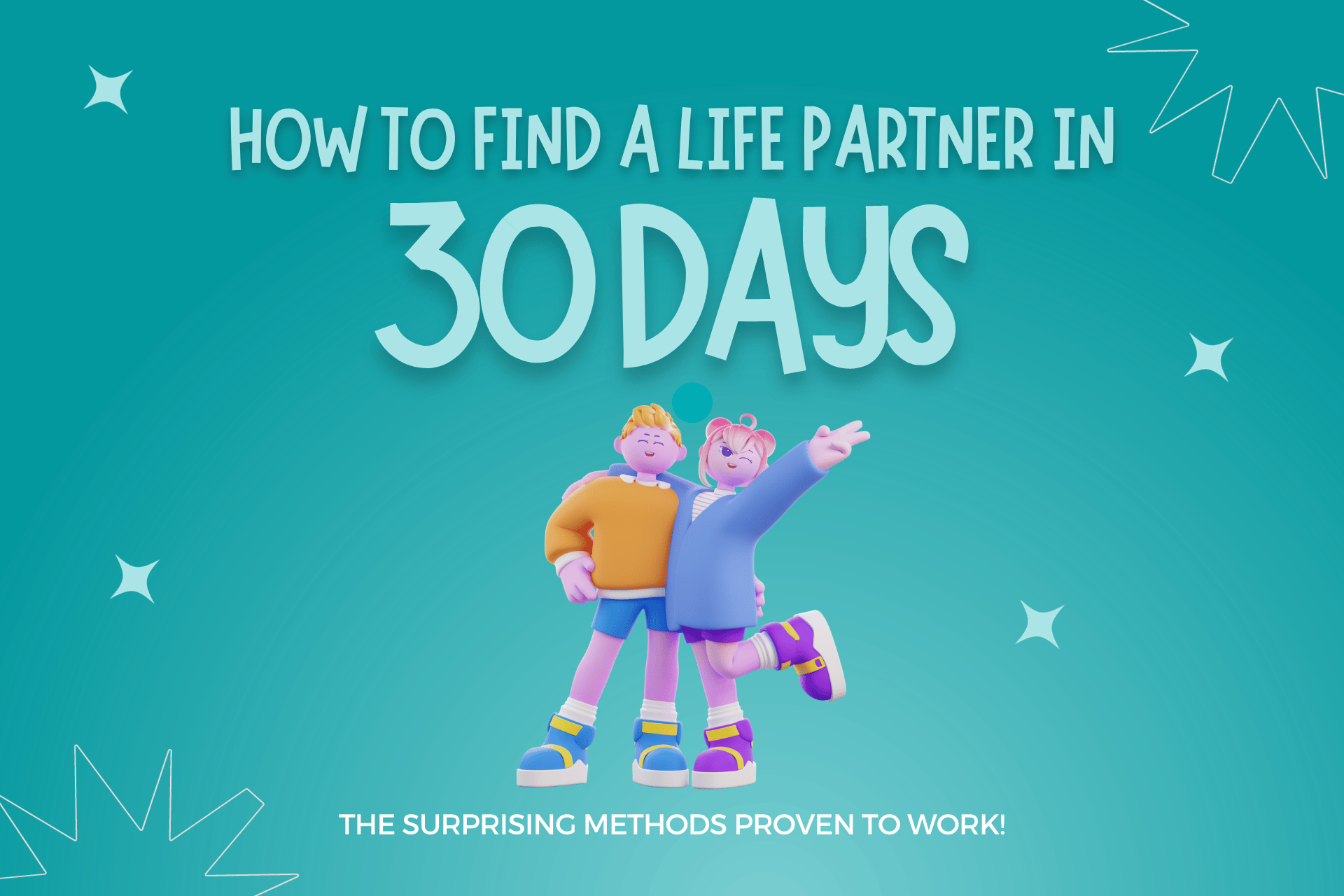
How to Find a Life Partner in 30 Days: The Love Hack Everyone Is Talking About!

A Platonic Life Partnership: How to Have Your Cake and Eat It Too—Without the Drama!
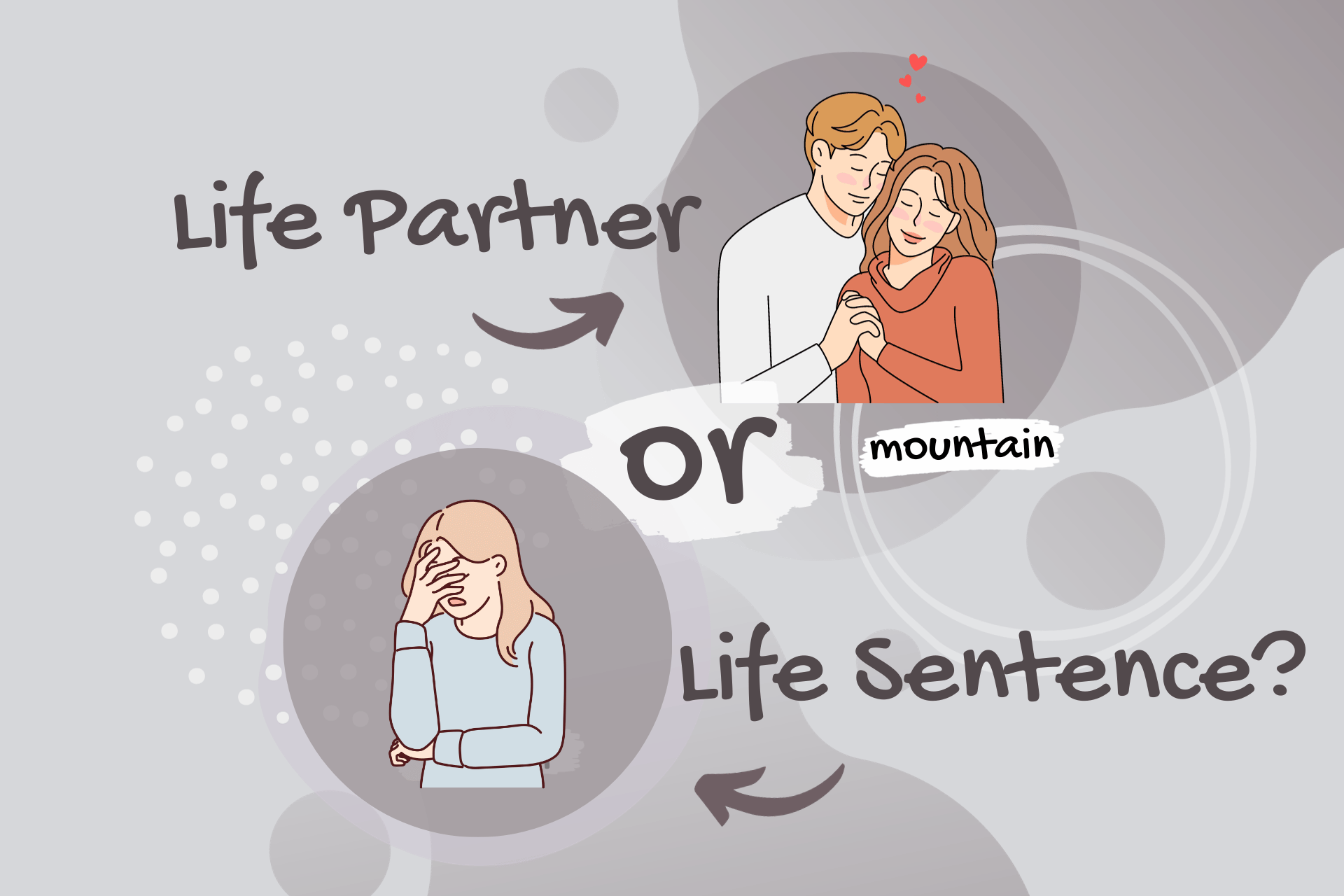
Life Partner or Life Sentence? How to Make the Right Choice

The Life Partner Quiz: Are You with ‘The One’ or Just ‘One of the Many’?
Related Articles
Resilience in Personal Relationships: 5 Surprising Ways It Can Reignite Your Love Life
10 Essential Needs in a Relationship: Discover What Can Really Make or Break Your Love Life
How to Find a Life Partner in 30 Days: The Love Hack Everyone Is Talking About!
A Platonic Life Partnership: How to Have Your Cake and Eat It Too—Without the Drama!
Life Partner or Life Sentence? How to Make the Right Choice



